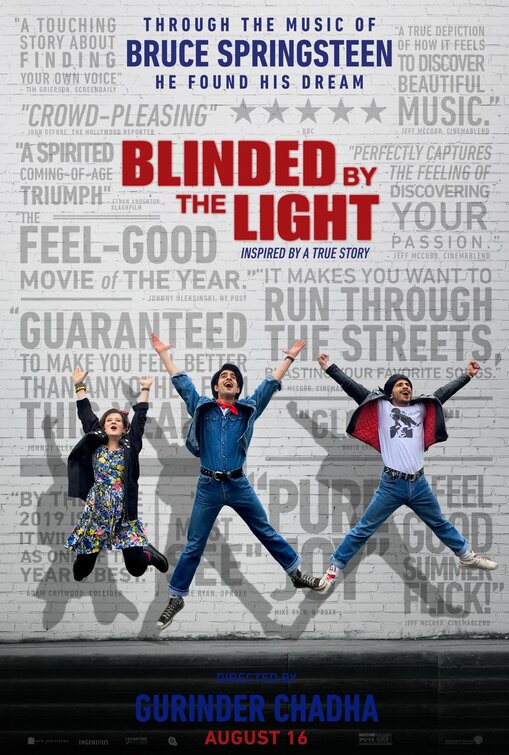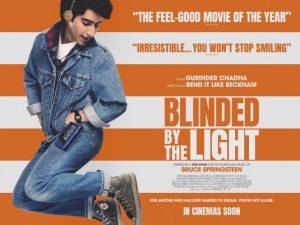Archive for the ‘Gurinder Chadha’ Category
These Words Paid for My Dream
Blinded by the Light

Director: Gurinder Chadha
Cast: Viveik Kalra, Kulvinder Ghir, Meera Ganatra, Aaron Phagura, Hayley Atwell, Dean-Charles Chapman, Nell Williams, Sally Phillips, Frankie Fox
Sometimes it’s the small British films which are the most impressive.
Bend it like Beckham and Viceroy’s House director Gurinder Chadha returns with a delightful coming of age story Blinded by the Light a comic snapshot of an Immigrant Pakistani family living in Luton, Northern England in the dark end of the 1980’s during Margaret Thatcher’s iron grip on Britain.

Blinded by the Light is set in 1987 and focuses on the dreams and aspirations of Javed beautifully played by Viveik Kalra whose struggling to find his identity as a British Asian young male who is harbouring dreams of becoming a successful writer.
Viveik Kalra has already won the breakthrough actor’s award at the Seattle International Film Festival and his performance as Javed is spot on, a tortured teenager dealing with an overbearing father, a claustrophobic family and an urge to break free out of Luton, which in 1987 was rife with racial intolerance, economic recession and hardship.
When Javed is sent to the local college to do his A Levels he is encouraged to continue writing poetry and find his own voice by his free thinking English Literature teacher Ms Clay played by Hayley Atwell (Brideshead Revisited, The Duchess). More significantly he befriends Roops played by Aaron Phagura who introduces him to the working class music of The Boss, the New Jersey singer Bruce Springsteen who become famous in the early 1980’s. Instantly Javed identifies with the lyrics of Springsteen who becomes his role model.
Springsteen’s music helps Javed find his writing voice much to the horror of his conservative father who keeps thinking that Springsteen is a Jewish American.
Blinded by the Light deals with more than one teenager’s musical obsession, as director Gurinder Chadha makes insightful comments on racism, following one’s dreams and the economic sacrifices an immigrant family has to make when moving to a new country: in this case Britain in the 1980’s.
Soon Javed discovers his inner writing talent, learns to stand up to his father and even travels to New Jersey after winning a literary competition. Blinded by the Light is a wonderful musical drama focusing on one young man’s dream to leave his bigoted hometown and discover his real talent. In a poignant scene when Javed confronts his hard-working conservative father Malik played by Kulvinder Ghir, he states that “These words paid for my dreams” after he writes an article for the Luton Herald about the local Mosque being threatened with imminent closure.
Blinded by the Light is a gem of a film and gets a rating of 8 out of 10.
Audiences will love this heartwarming story of Javed whose literary dreams are inspired by the lyrics of Bruce Springsteen, although this distinctly British film is personal, relevant and less flashy.
Dividing a Subcontinent
Viceroy’s House
Director: Gurinder Chadha
Cast: Hugh Bonneville, Gillian Anderson, Michael Gambon, Simon Callow, Lily Travers, Manish Dayal, Om Puri, Huma Qureshi, Simon Williams
Bend it Like Beckham Kenyan born, British director Gurinder Chadha’s handsome post-colonial film Viceroy’s House about the partitioning of the Indian subcontinent in August 1947 effortlessly blends documentary footage of the historic event with gorgeous production design and exquisite costumes.
Fresh from his success as playing Robert Crawley, Earl of Grantham in the hit BBC series Downton Abbey, Hugh Bonneville turns in a nuanced performance as Lord Louis Mountbatten the last Viceroy of India who has daunting task of giving India its independence after 300 years of British rule.
Lord Louis Mountbatten is accompanied by his affected yet compassionate wife Lady Edwina Mountbatten played by Gillian Anderson (Shadow Dancer, The Last King of Scotland). Lily Travers (Kingsman: Secret Service, Me Before You) plays their daughter Lady Pamela Hicks.
The actual task of dividing the subcontinent into India and Pakistan so brilliantly written about in Salman Rushdie’s seminal post-colonial text Midnight’s Children is taken up by Sir Cyril Radcliffe in Viceroy’s House superbly played by Simon Callow the stalwart supporting actor of all those Merchant Ivory film’s in the 1980’s and 90’s from A Room with a View to Howard’s End and Jefferson in Paris.
Sir Radcliffe after admitting that he has never stepped foot in the Punjab admits that this is “a monstrous responsibility for one man”.
Equally on edge at the thought of a massive subcontinent being divided and suddenly changing power, are the two love interests of Viceroy’s House, the Hindu manservant Jeet wonderfully played by Manish Dayal (The Hundred-Foot Journey) and his Muslim girlfriend Aalia played by Huma Qureshi. Aalia, a bright and intelligent woman has to look after her father Ali Rahim Noor played by the recently deceased veteran Indian actor Om Puri (The Hundred-Foot Journey, Gandhi).
Michael Gambon who was so brilliant in Brideshead Revisited makes a welcome addition to the British cast as General Lionel Hastings who proves to be more deviant and manipulative as the partition date approaches in the summer of 1947.
In terms of setting the right political tone for the Viceroy’s House director Gurinder Chadha relies heavily on actual news and documentary footage of the partition and the massive disruption and refugee crisis it created when the subcontinent broke into India and Pakistan and then again into Bangladesh.
Chadha chooses to use the actual historical Viceroy’s house a sumptuous Empire palace to metaphorically show a subcontinent being torn into two as all the house servants had to literally choose which country to belong to in the space of three weeks: India or Pakistan, as well as callously divide up all the possessions of this magnificent estate.
From a historical perspective, Viceroy’s House is a fascinating film about the after effects of colonialism and the subsequent first heady days of independence in this case not of one country but two divided controversially along religious lines, Hindu and Muslim.
Audiences that enjoyed Midnight’s Children, Heat and Dust, A Passage to India, will certainly enjoy Viceroy’s House although these films are a far cry from the contemporary portrayal of India and Pakistan in such films as Danny Boyle’s Slumdog Millionaire and Mira Nair’s The Reluctant Fundamentalist.
Fascinating, tragic and historically relevant, Viceroy’s House with its sumptuous production design and beautiful costumes gets a film rating of 8 out of 10.

